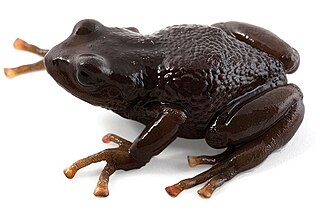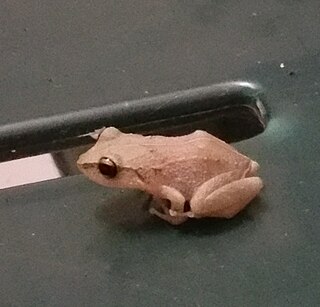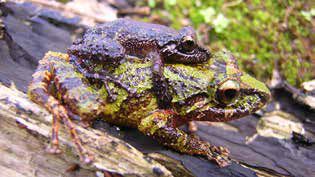Pristimantis actinolaimus is a frog species in the family Strabomantidae. It is endemic to Colombia and only known from the vicinity of its type locality, El Estadero, in Samaná, Caldas Department, on the eastern slopes of the Cordillera Central. The specific name actinolaimus is derived from the Greek aktinos (=ray) and laimos (=throat) and refers to the radiating lines on the throat of this frog.

Pristimantis bacchus is a species of frog in the family Strabomantidae. It is endemic to the western slopes of the Cordillera Oriental in the Santander Department, Colombia. In a loose reference to its blood-red eyes, this species is named for the Roman God of Wine. Common name wine robber frog has been coined for it.
The false green robber frog is a species of frogs in the family Eleutherodactylidae. It is endemic to the Massif de la Hotte, southwestern Haiti.
Eleutherodactylus counouspeus, also known as Counou robber frog and yellow cave frog, is a species of frog in the family Eleutherodactylidae. It is endemic to the Massif de la Hotte, southwestern Haiti. The specific name counouspeus refers to its type locality, Counou Bois Cave, with speus being Greek for "cave". Hedges and colleagues suggested in 2008 that it should be placed in its own monotypic subgenus, Schwartzius, reflecting its distinctiveness and honoring Albert Schwartz for "his contributions to the herpetology of the West Indies."
Pristimantis croceoinguinis is a species of frog in the family Strabomantidae. It is found in the lowland Amazon rainforest of southern Colombia, eastern Ecuador, and extreme north-eastern Peru, likely also extending into the adjacent Brazil. The specific name croceoinguinis refers to the color of the inguinal spots of this frog. Common name Santa Cecilia robber frog has been proposed for it.

Eleutherodactylus gossei is a species of frog in the family Eleutherodactylidae. It is endemic to Jamaica where it is widespread. An introduced population existed in Bermuda but appears to have been extirpated. The specific name gossei honors Philip Henry Gosse, an English naturalist, missionary, and science writer. Its common names are Jamaican forest frog and Spaldings robber frog, the latter apparently after Spaldings, its type locality.
Pristimantis lichenoides is a species of frogs in the family Strabomantidae. It is endemic to Colombia and is only known from the vicinity of its type locality near Samaná in the Caldas Department, on the eastern slope of the Cordillera Central. The specific name lichenoides refers to its lichen-like dorsal coloration as well as its habit of being plastered to rock surfaces, resembling lichens growing on rocks.
Pristimantis maculosus is a species of frog in the family Strabomantidae. It is endemic to Colombia and is only known from a few localities in the Cordillera Central in Caldas, Antioquia, and Quindío Departments. The specific name maculosus is Latin for "dappled" or "spotted" and refers to the pale spots on the hidden surfaces of this species. Common name spotted robber frog has been coined for it.
Pristimantis modipeplus is a species of frog in the family Strabomantidae. It is endemic to the Andes of central Ecuador in Chimborazo, Pichincha, and Tungurahua Provinces. Common name Urbina robber frog has been proposed for it.

Pristimantis orcesi is a species of frog in the family Strabomantidae. It is endemic to the Andes of central and northern Ecuador. The specific name orcesi honors Gustavo Orcés, an Ecuadorian naturalist. Common names Orces robber frog and Bolivar robber frog have been proposed for this species.

Eleutherodactylus pinchoni is a species of frog in the family Eleutherodactylidae. It is endemic to Guadeloupe and known from the Basse-Terre. Common name Grand Cafe robber frog has been coined for it.
Pristimantis polemistes is a species of frogs in the family Strabomantidae. It is endemic to Colombia and only known from the vicinity of its type locality in Urrao, Antioquia Department, on the western flank of the Cordillera Occidental. The specific name polemistes is Greek for "warrior" and refers to the insurgents that operated in the area of the type locality.
Eleutherodactylus rhodesi is a species of frog in the family Eleutherodactylidae. It is endemic to Haiti, where it is only known from the area of its type locality on northeastern base of the Presqu'ile du Nord-Ouest, near Port-de-Paix, Nord-Ouest department.

Pristimantis riveroi is a species of frog in the family Strabomantidae. It is endemic to Venezuela and only known from the region of the type locality in the Serranía del Litoral in the state of Aragua. The specific name riveroi honours Juan A. Rivero, a Puerto Rican herpetologist. Accordingly, common name Rivero's ground frog has been proposed for it.
Pristimantis rosadoi is a species of frog in the family Strabomantidae. It is found in north-western Ecuador in Carchi, Esmeraldas, and Pichincha provinces, and in the adjacent Colombia in the Nariño Department as well as on the Gorgona Island; there is some doubt about the identity of the Gorgona Island specimens, while the checklist of Colombian amphibians only mentions the Gorgona record. The specific name rosadoi honors José P. O. Rosado, herpetologist at the Museum of Comparative Zoology, and also alludes to similarity of this species to Pristimantis roseus. Common name Rosado's robber frog has been proposed for it.
Pristimantis shrevei is a species of frog in the family Strabomantidae. It is endemic to Saint Vincent, the West Indies. Its common name is Saint Vincent frog.
Pristimantis tribulosus is a species of frog in the family Strabomantidae. It is endemic to Colombia and is only known from the vicinity of its type locality near Samaná in the Caldas Department, on the eastern slope of the Cordillera Central. The specific name tribulosus, meaning "thorny", refers to the numerous tubercles that cover the upper surfaces of this species.
Pristimantis veletis is a species of frog in the family Strabomantidae. It is endemic to Colombia and is only known from the vicinity of its type locality in Samaná and Pensilvania municipalities in the Caldas Department, on the eastern slope of the Cordillera Central. The specific name veletis is Latin from "skirmisher". It alludes to the resemblance of the color pattern of this frog to the camouflage clothing of the guerillas that were present in the area of the type locality, as well as to the chin pattern that loosely resembles the chevrons in some military uniforms.
Eleutherodactylus zugi is a species of frog in the family Eleutherodactylidae. It is endemic to western Cuba and is known from Pinar del Río and Artemisa provinces. The specific name zugi honors George Robert Zug, an American herpetologist. Common names Rosario red-legged frog and Zug's robber frog have been coined for it. Eleutherodactylus erythroproctus was originally described as a subspecies of Eleutherodactylus zugi, and is sometimes still treated as such.





